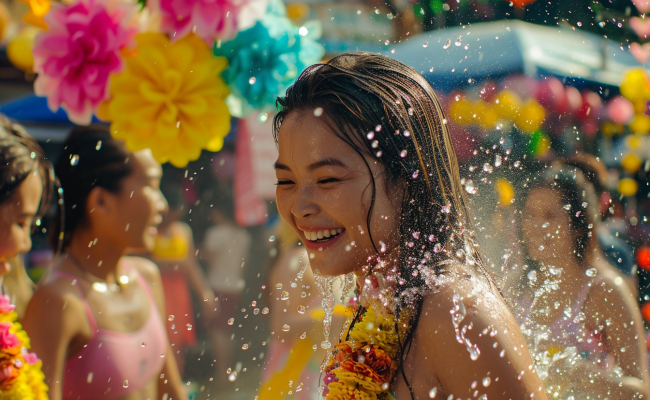Thai New Year, also known as Songkran Splendours, is a national holiday. Songkran is celebrated on April 13 each year, although the holiday lasts from April 14 to 15. The Thai cabinet extended the festival to seven days, from April 9 to 16, 2018, to allow citizens to travel home for the holiday. The holiday was observed from April 9-16, 2019, because April 13 was a Saturday. The term “Songkran” originates from the Sanskrit word saṃkrānti, which translates to “astrological passage” or “transformation or change” . It corresponds with the rising of Aries on the astrological chart and the New Year of several Southeast and South Asian calendars, including the Buddhist and Hindu calendars. The New Year is celebrated at roughly the same time in several South Asian countries, including China.
Songkran Meaning
The phrase Songkran comes from the Sanskrit word saṅkrānti, which means ‘to move’ or’ movement. It is derived from the sun’s movement from one location to another in the zodiac. A Songkran, as its literal definition in Sanskrit suggests, happens once a month. Songkran, as it is known in Thailand, occurs when the sun changes from Pisces to Aries in the zodiac. This period should be referred to as Maha Songkran (‘great Songkran) , as it coincides with the New Year. The Songkran event is thus a solar-calendar-based New Year celebration. The celebration spans three days: The 13th of April is known as Maha Songkran, the day when the sun enters Aries in the zodiac, or the last day of the old year. The following day, 14 April, is called Wan Nao, the transitional day between the old and new years, and 15 April is designated Wan Thaloeng Sok (Thai: วันเถลิงศก ‘to begin a new period or year’), New Year’s Day itself.
When is the Songkran Festival 2024?
Thailand’s Songkran festival, which generally lasts three days from April 13th to 16th, will be significantly expanded in 2024. The Thai government committee plans to extend the celebrations from April 1 to April 21, 2024, rather than the regular three days. This ambitious endeavor aims to cement Thailand’s place among the world’s top ten festival destinations. By extending the festivities, organizers seek to attract more visitors and display Songkran’s rich cultural legacy and energetic energy on a larger scale, increasing Thailand’s attraction as a prime destination for immersive cultural experiences.
How Do Locals Celebrate Songkran Festival?
Visit Buddhist Temples
Thais commemorate Songkran in a variety of ways, including visiting sacred temples first thing in the morning. Many local Buddhists devote their mornings to paying respects at these renowned sites, with some even planning to visit nine important temples in one day. Worshippers at these temples present food and water to the temple monks in hopes of receiving blessings for the new year. During this auspicious time, well-known temples in Bangkok, like Wat Pho, Wat Arun, Wat Boworn, and Wat Benchamabophit, draw vast crowds of devout followers, showing Songkran’s deeply embedded religious and cultural significance in Thai society.
Bathe Buddha Statues
Celebrate Songkran with reverence as Thais worship Buddha through the traditional Song Nam Phra rite. This religious rite is bathing representations or statues of the renowned teacher with scented water to remove any lingering misfortune, symbolizing purification for the new year. Locals pour or sprinkle water on Buddha to demonstrate their sincere respect and devotion while also embracing the festival’s spiritual core. As part of the Songkran celebrations, this rite not only honors Buddhist teachings but also represents a community yearning for rejuvenation and benefits in the next year, adding to Thailand’s cultural tapestry.
Pay Respect To Elders
Thais celebrate Songkran by reconnecting with their families through the traditional rite of Rod Nam Dam Hua. Many people travel to their hometowns to visit their parents and elders, which represents respect and gratitude. In this touching rite, they pour perfumed water over their elders’ palms as a sign of respect and beg blessings for the new year. This ceremony not only builds family bonds, but it also promotes filial piety and tradition, building a sense of unity and peace throughout Thai communities over the holiday season.
Where is Songkran Celebrated in Thailand?
Songkran celebrations take place throughout Thailand. The most popular sites for a water fight in Bangkok are Khao San Road and Silom Road. Expect to see thousands of people on the street hunting for new faces to drench!
Phuket is another destination for parties. There will undoubtedly be dozens of beach parties at this period, particularly in the commercial areas of Patong Beach, Bangla Road, and Saphan Hin Park. Pattaya, northern Thailand’s party hotspot, also hosts spectacular parties. If you’re on Koh Samui around the time, you may still enjoy the festivities, albeit they’ll be more subdued than in Phuket and Pattaya. Chaweng Beach is a renowned location for the Thai New Year celebrations, which include wild parties. The traditional Songkran event can be enjoyed on the western shore of Koh Samui.
For those looking for a more melancholy celebration, the old city of Chiang Mai is a great choice. It serves as a cultural and religious center as the historic capital of the Lanna kingdom, with moats and castle ruins still visible. Every year, it hosts traditional Songkran celebrations. People congregate at Thapae Gate, which was originally a fortification for the ‘Old City’ and is now surrounded by a network of waterways. Wat Ratchabophit and Wat Prayoon in Bangkok are peaceful places to celebrate Songkran.
